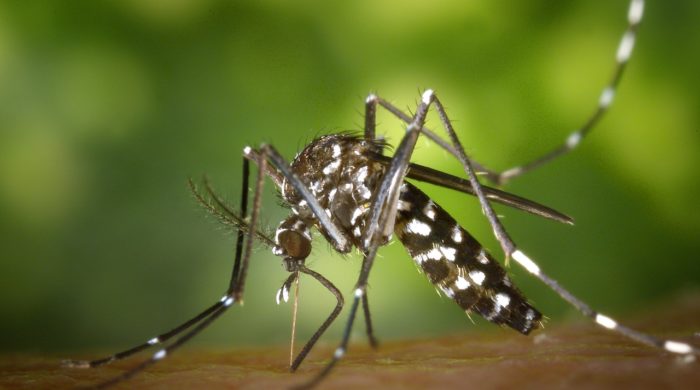Chances are, you’re no stranger to mosquitoes; those pesky flying insects that you frantically swat away before they leave an itchy (and sometimes painful) reminder that they were there. The hard truth is, mosquitoes can be more than just annoying; they can spread viruses that are very dangerous to humans.
So before you plan your next outdoor BBQ, end of summer vacation, or weekend camping trip, make sure you and your family are prepared to protect yourselves against these small, threatening insects.
Why Are Mosquitoes Dangerous?
According to National Geographic, scientists consider mosquitoes to be among the deadliest creatures in the world. This is because of their ability to spread dangerous, blood-borne viruses (and fungi) from one victim to the next.
Male mosquitoes won’t bite you, but female mosquitoes need blood to reproduce. When a female mosquito bites her victim, she sucks their blood and stores it inside her body. If the blood is infected, she becomes a flying vehicle for disease. She can then transfer disease through her saliva to a new victim.
Once a disease is contracted, the viruses can cause a person to have extreme fever-like symptoms, birth defects, and even death (if left untreated).
Serious and common viruses spread by mosquitoes include:
- Dengue
- Zika
- West Nile
- Malaria
- Yellow Fever
- Japanese Encephalitis
Some mosquitoes bite during the day, and others bite at night, so stay protected at all times and especially when you’re enjoying the outdoors in warm weather.
How Can You Prevent Mosquito Bites?
Knowing how dangerous these little insects can be, we urge you to take steps to protect your family from mosquito bites. Here are a few ways to prevent mosquito bites, and to reduce your risk of contracting a virus through a mosquito bite:
Vaccines
If you are travelling abroad (or to an area with a large mosquito population), it’s always a good idea to speak to your physician ahead of time about your trip. Some countries require certain vaccinations before entering the country to help protect against the spread of disease. Your physician may prescribe anti-malaria medication or other vaccines to help protect against mosquito-borne diseases.
Repellent
Mosquito repellent is a great way to protect your family from mosquitoes. Purchase EPA-Registered insect repellent with one or more of these active ingredients:
- DEET
- Picaridin
- IR3535
- Oil of lemon eucalyptus (OLE) or para-menthane-diol (PMD)
- 2-undecanone
Read the warning label, follow the product instructions, and reapply the repellent as directed. Don’t apply insect repellent on broken or irritated skin. Always apply repellant over clothing, and after applying any other lotions, sunscreens, or products. Read labels and apply insect repellent only to age-appropriate children, being careful to avoid their hands, eyes, and mouth.
Clothing
Wear clothing that covers your body and is made of thick, durable material. Treat your clothing with mosquito-repellant permethrin, or purchase pre-treated gear and clothing for an added layer of protection. If you have children, make sure to cover their exposed skin with clothing, and use a mosquito net around cribs, playpens, and strollers to form a physical barrier of protection.
Home
Secure your home so that mosquitoes can’t get inside by keeping windows and doors closed, installing screens, and turning on your air conditioning (mosquitoes hate cold weather).
A mosquito’s favourite breeding ground is standing water; they lay their eggs in planters, outdoor toys, trash cans, tires, rain gutters, and anything else that collects water, so do regular checks around your house and dry (or dispense of) anything that collects water.
What To Do If You Get A Mosquito Bite
If you get a mosquito bite, you will likely notice a red, hard bump on the site. It will sting and feel itchy, and may even swell up. Everyone reacts to mosquitoes differently; if you have an allergic reaction, you may experience hives, swelling, or swollen lymph nodes. Typically, the symptoms of a mosquito bite go away within a few days.
The itch from a mosquito bite means your body’s natural immune response has been triggered to heal the bite. If you know you’ve been bitten, don’t itch the site. Itching can irritate and open the skin and can lead to infection. Instead, take the following steps:
- Wash the site with soap and warm water to sterilize the site.
- Apply an ice pack to reduce swelling.
- Take an over-the-counter pain reliever (follow the directions on the label) to manage pain and swelling.
- Use a topical anti-itch medication such as calamine lotion to relieve itchiness.
Contact your physician or seek urgent care for your mosquito bite if you notice the following:
- Headache
- Fever
- Body or joint pain
- Confusion/disorientation
- Aching and stiffness in joints
- Swollen lymph nodes
- Weakness
- Rash
If you experience any of these symptoms or believe you are having an extreme reaction to a mosquito bite, contact your primary care provider or seek urgent care right away.
In the Pacific Northwest, mosquitoes are most active during the summer. While most mosquitoes are nothing more than nuisances, they can be dangerous. From all of us here at WWMG, this is our reminder to stay diligent for a happy, healthy summer.
